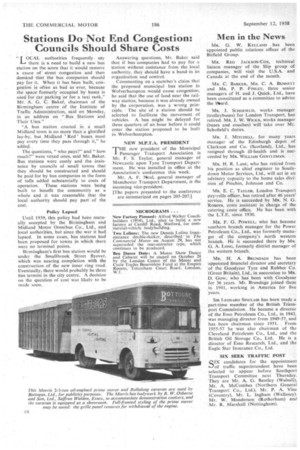Stations Do Not End Congestion: Councils Should Share Costs
Page 42

If you've noticed an error in this article please click here to report it so we can fix it.
L0 authorities authorities frequently say Le there is a need to build a new bus station on the score that it Would remove a cause ofstreetcongestion and then demand that the -bud companies should pay for it. When it has been built, ccingestion is. often as bad as 'ever, because the space formerly Occupied by buses is uied for Cate parking. or for a taxi rank," Mr. A. G. C. 'Bake, chairman of the Birmingham centre ..Of the Institute of Traffic Administration, said on Monday, in an address on "Bus Stations and Their -Uses." .
"A bus station. erected in a small Midland tOwn is no more than a glorified lay-by, but Midland ` Red ' 'buses, must pay every time they pass through it," he added.
The questions, "who pays?" and "how much?" were vexed ones, said Mr. Baker. Bus stations were costly and the insistence by councils of small towns that they should be constructed and should be paid for by bus companies in the form of tolls added substantially to costs of operation. These stations were being built to benefit the community as a whole and it was reasonable that the local authority should pay part of the cost.
Policy Lapsed Until 1939, this policy had been mutually. accepted by the Biriningham and Midland Motor Omnibus Co., Led., and local authorities, but since the war it had lapsed. In some cases, bus stations had been proposed for towns in which there were no terminal points.
Birmingham's first bus station would be under the Smallbrook Street flyover, which was nearing completion with the construction of the new inner ring 'road. Eventually, there would probably be three bus termini in the city centre. A decision on the question of cost was likely to be made soon. Answering questions, Mr. Baker said that if bus companies had to pay for a station without assistance from the local authority, they should have a hand in its organization and control.
Commenting on a member's claim that the proposed municipal bus station in Wolverhampton would cause congestion, he said that the use of land near the railway station, because it was already owned by the corporation, was a wrong principle. The site of a station should he selected to facilitate the movement of vehicles. A bus might be delayed for three quarters of an hour before it could enter the station proposed to be built in Wolverhampton.
NEW M.P.:LA. PRESIDENT
THE new president of the Municipal Passenger Transport Association is Mr. F. S. Taylor, general manager of Newcastle upon Tyne Transport Department. He was installed in office at the Association's conference this week.
Mr. A. F. Neal, general manager of Manchester Transport Department, is the incoming vice-president.
[The papers presented to the conference are summarized on pages 205-207.1
























































































































